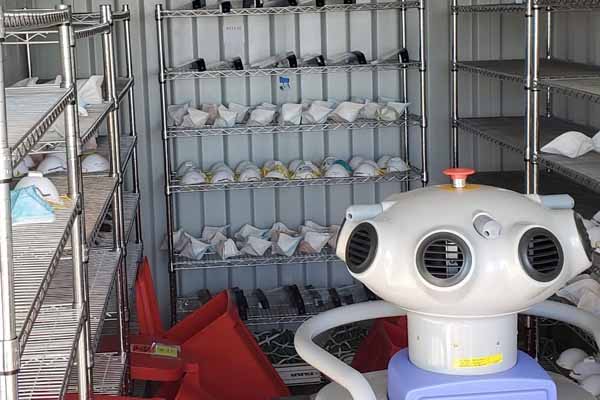
The international shortage of N95 masks has forced Texas physicians to reuse existing masks – a desperation tactic with an obvious drawback: Used masks are unsanitary.
Some hospitals and health care institutions have decontamination chambers to sterilize the used masks, but the Texas Tech University Health Sciences Center (TTUHSC) in Lubbock has created a chamber that can decontaminate 10,000 masks at a time. The center is offering to do it for free for any Texas physician or medical entity that needs it.
The TTUHSC project plans to help medical institutions of any size, says Min Kang, interim senior vice president for research and head of the decontamination project and a pharmacist.
“But the organizations that really, really need help [with reusing masks] are small private practitioners, hospitals, and health care organizations because they can’t get the N95 masks, and they don’t have the resources to send them out for decontamination,” she said.
The Lubbock County Medical Society is promoting the project – and a local dropoff site – to all of its members, says Executive Director Juanema Christensen.
Lubbock’s University Medical Center (UMC) was one of the first customers, says Jacob Nichols, MD, the hospital’s medical director for infection prevention and control. UMC has limited decontamination facilities that can sterilize small batches of masks, but the TTUHSC facility will make thousands more masks ready to use.
“We do have some [masks] available, but we know we haven’t reached our peak number of patients yet [in the pandemic], so we’re wanting to conserve the things that we have right now so that moving forward we still have some supplies,” Dr. Nichols said.
UMC and eight other institutions had masks sterilized in the TTUHSC unit’s first run, Ms. Kang says. The unit, located at The Institute of Environmental and Human Health in Lubbock, decontaminates using a device that vaporizes hydrogen peroxide.
The masks are arranged on wire shelves, exposed to the vapor for 15 minutes, and then allowed to aerate for four to five hours. Eight bioindicator cards containing hard-to-kill bacteria are put in with the masks to show the decontamination is compete, she says.
The U.S. Centers for Disease Control and Prevention offers guidelines on decontaminating masks, as well as precautions health care professionals should follow when using decontaminated masks. The Texas Department of State Health Services says that decontamination should be viewed “only as a crisis capacity strategy.”
“I’m hoping this will alleviate the problems so that at some point the supply chain will be restored,” Dr. Nichols said.
Masks can be safely decontaminated two or three times, according to a U.S. government study. But they tend to fall apart quickly after steady use, Dr. Nichols says.
“Studies have shown that the masks can be safely decontaminated and retain their filtration efficacy,” he said. “The main issue is that after several cycles, the straps start to break down, and if you don’t have the straps, the mask is essentially nonfunctional.”
The Food and Drug Administration gave emergency approval to the hydrogen peroxide decontamination method in March so that masks and other personal protective equipment (PPE) could be sterilized and reused, Ms. Kang says. The approval was just for Battelle, an Ohio nonprofit, but other organizations and companies are using it as well, she says.
The equipment for the process can be found only at facilities with a rating of biosafety level 3 or 4, the labs equipped to study the most dangerous types of pathogens, Ms. Kang adds.
While TTUHSC will decontaminate masks and PPE like face shields without cost, the medical practices or health care institutions sending masks must take care of transporting the items to the Lubbock facility, she says. U.S. Department of Transportation rules require that used masks and contaminated PPE must be put in biohazard bags that are then put in biohazard containers before being shipped, she says.
TTUHSC plans to decontaminate masks two days a week, but it will do more if demand from physicians and medical institutions calls for it. For more information, contact Ms. Kang at (806) 743-2694 or via email. Or, contact Justin White, senior director of the TTUHSC president’s staff, at (806) 743-2900 or via email.